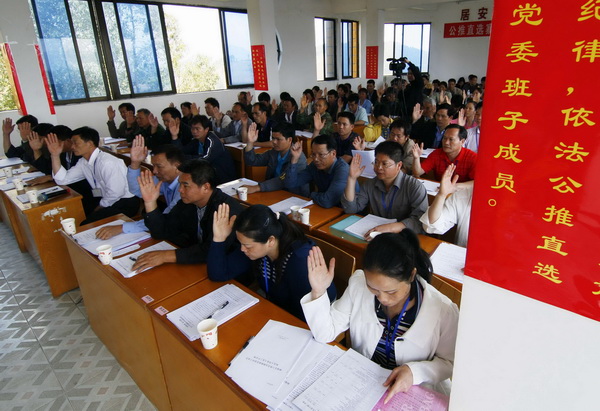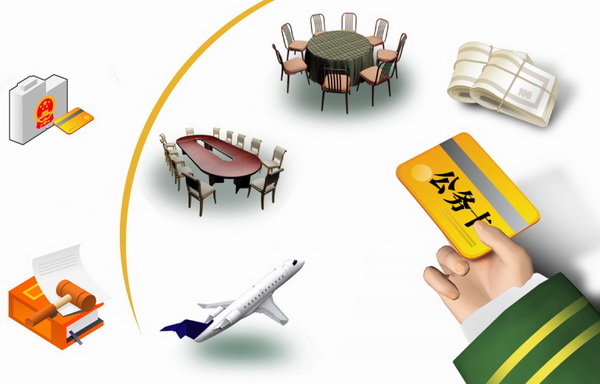

Highlights from the EO print edition, No. 635, Sep 2, 2013
CNPC Rocked by Anti-Graft Probe
News, page1
~ A string of senior executives from China National Petroleum Corporation (CNPC) are being investigated for "serious violations of discipline," a charge that usually means corruption.
~ Large scale investments and developments by China's largest oil company have long been suspected of breeding corruption.
~ For example, "inefficient oil fields" and "abandoned oil wells" have reportedly been used by Wang Yongchun (王永春), a deputy general manager at CNPC and one of the officials being investigated, for his own private enrichment. These supposedly useless fields in fact still contained great value, which was put into the hands of private interests through a series of corrupt deals. Other illicit deals have reportedly been made through overseas oil and gas exploitation.
~ Wang Yongchun and other executives were also allegedly involved in corruption related to property developments involving the Real Estate Development Co., Ltd of Daqing Oil Field (大慶油田房地產(chǎn)開發(fā)有限公司).
~ According to a discipline inspector at a CNPC's subsidiary company, Wang also stands accused of nepotism and trading power for money in appointing cadres.
~ Wang Yongchun was once considered a likely successor to Jiang Jiemin (蔣潔敏) as chairman of CNPC after the latter was elevated to director of State-owned Assets Supervision and Assessment Commission (SASAC) in March of this year. It was recently revealed that Jiang too is under investigation for corruption.
~ "The power of subsidiary companies has been too concentrated these years; especially in the Daqing and Changqing oil fields," a retired CNPC official told the EO. "It shows the weakness of Party Management over Cadres (黨管干部). Absolute power breeds corruption."
Original article: [Chinese]

Alipay Clashes with UnionPay
News, page 1
~ On Aug 27, the third-party online payment service Alipay announced that it would be suspending its offline point of sales (POS) service for small companies. It said it was doing so for "reasons that are obvious to everyone" (眾所周知的原因) without elaborating.
~ Market analysts have said these reasons likely include pressure from UnionPay – China's monopoly bank card service - for Alipay to route its POS service through UnionPay's system.
~ Earlier in August, UnionPay held a meeting with 52 payment institutions that it cooperates with where it reportedly instructed them that they must route transactions with other companies through UnionPay. Alipay did not attend the meeting.
~ Shanghai Bank was the first to be criticized and fined by UnionPay after it attempted to cooperate with Alipay's POS service.
~ In March of 2012, Alipay had planned to invest 500 million yuan in its POS business. This was to be done in cooperation with UnionPay, but analysts say if Alipay's POS business matured, it could break the cooperation and compete head-on with UnionPay's offline payment services.
~ UnionPay has strong ties with commercial banks, and many of Alipay's services present a threat to both.
~ Alipay has even produced a "Virtual Credit Card," giving loans to its customers. But conventional savings and loans branches of commercial banks are greatly threatened by Alipay's expansion into the financial services market, where it often gives higher returns to customers than deposit returns from banks.
~ Analysts say this is part of a broader effort by UnionPay to keep a tight grip on third-party payment platforms.
Original article: [Chinese]

"Purification of Party Members" in Tongxiang
News, page 5
~ In Tongxiang (桐鄉(xiāng)), Zhejiang Province, 36,425 Communist Party members have participated in a "purification project" (凈化工程) conducted by local party authorities. Purification projects aim to dismiss party members that are no longer "qualified" (不合格). The purification project has been in the spotlight since the People's Daily covered the story in late August.
~ It was all the idea of Lu Yuedong (盧躍東), secretary of the Tongxiang Municipal Committee of the Communist Party. After hearing complaints that a few party members were "uncultivated" (素質(zhì)低下), Lu decided to improve their overall quality by launching the purification project.
~ One major highlight of the project is the dismissal scheme, which includes "ten bottom lines" (十大紅線規(guī)定) Whoever violates these ten rules will be immediately defined as "unqualified." The ten rules include things like violating the One-Child Policy, defaming the country or the party and being absent from party activities.
~ If a member is deemed unqualified, he has a year to re-educate and redeem himself. After one year, he will undergo a range of evaluations so the party can decide whether he should be dismissed.
Original article: [Chinese]

Civil Servants Shunning Officially Issued Bank Cards
News, page 5
~ Over the past few years, the central government has promoted the use of official bank cards (公務(wù)卡) issued specifically for civil servants. Using these cards to pay for official expenses like receptions and business trips theoretically should make expenditures easier to supervise.
~ However, the majority of these cards are not being used. According to a report by the Beijing Audit Bureau (北京審計局), 431 out of 851 cards issued in the city before 2011 never recorded a single transaction.
~ A local financial officer says that there are several reasons for this. The first reason is the restrictions that come with the card. For instance, a civil servant may only check in to certain hotels with the card. Furthermore, civil servants can still make payments and get reimbursements in cash, leaving them little incentive to use the card. Finally, many government departments simply resent the idea of having their finances so strictly supervised.
Original article: [Chinese]
China Agrees to Suspend Laws to Support Establishment of Shanghai Free Trade Zone
Nation, page 13
~ China's National People's Congress (NPC) has agreed to suspend the implementation of certain laws related to foreign enterprises at a pilot free trade zone in Shanghai. This marks the first moves in an effort to shake up China's system for managing foreign investment.
~ On Aug 26 (Xinhua), the standing committee of China's top legislature discussed a draft proposal on establishing a pilot free trade zone in Shanghai. Approved by the executive meeting of the State Council, the draft proposal sought the NPC's authorization to temporarily suspend several laws within the trade zone.
~ According to the original draft, a "negative list" (負面清單) approach was going to be adopted - so that all type of foreign investment would be allowed aside from those that had been declared off limits. This contrasts with the existing "foreign investment catalogue" approach that is currently implemented in China which basically assigns all kinds of foreign investment into one of the following three categories - encouraged, restricted or prohibited.
~ The draft proposal also called for the temporary suspension of the following four laws: the Law on Foreign-Capital Enterprises (外資企業(yè)法), Law on Chinese-Foreign Equity Joint Ventures (中外合資經(jīng)營企業(yè)法), Law on Chinese-foreign Contractual Joint Ventures (中外合作經(jīng)營企業(yè)法) and the Law on Protection of Cultural Relics (文物保護法). The laws would be suspended for a period of three years within the new Shanghai FTZ.
~ However, the version of the policy that was eventually adopted by law makers on Aug 30 was slightly different to the original draft. The initial reference to a "negative list" had been changed to investors that had been given "Approval for Special Management Methods" (國家規(guī)定實施準入特別管理措施) and there was no mention at all of temporarily suspending the Law on Protection of Cultural Relics.
~ Wang Zhengchao (王正超), a lawyer familiar with Overseas Foreign Direct Investment (OFDI) law, told the EO that the temporary suspension of these laws will mean that some foreign investors will no longer have to seek approval to invest and may simply have to register.
~ Chen Bo (陳波), a professor at the Shanghai University of Finance and Economics (上海財經(jīng)大學), told the EO that "From start to finish the Shanghai FTZ has emphasized the point that it needs to be 'reproducable' and 'promotable,' and China's ultimate goal is to gain the qualifications required to join the Trans-Pacific Partnership (TPP) through the establishment of this free trade zone."
Original article: [Chinese]

Wuhan's Hidden Debt Burden
Nation, page 9
~ The launch of another audit of local government debt in early August has once again placed the issue of local debt under the spotlight.
~ One of the cities that auditors will be paying close attention to is the central Chinese metropolis of Wuhan which has racked up billions of yuan in debt to finance the construction of urban infrastructure in recent years.
~ There are conflicting reports about just how dire the situation in Wuhan is and the municipal government has not publicly released specific details of the city's debt.
~ The Economic Observer recently received a research report conducted by the Ministry of Finance's representative in Hubei Province. According to this report, as of June 2012, the city of Wuhan itself had 203.7 billion yuan in outstanding debts. At the end of 2011, the government debt of local governments under the authority of Wuhan city had reached 196.5 billion yuan.
~ Given that the city of Wuhan has "comprehensive financial resources" (政府綜合財力) of 105.8 billion yuan, the debt ratio of the city is already over 185 percent. According to the most recent audit conducted into 36 local governments by the National Audit Office (NAO) from Nov 2012 to Feb 2013 and released in June this year, the highest debt ratio of a provincial capital city reached 189 percent or 220 percent once all the debts that the government guarantees have also been included.
~ A member of the team from the NAO currently in Wuhan to investigate the city's debt situation, told the EO that the results of the audit would be made availalbe befor the third plenum of the 18th Party Congress which is set to take place sometime in November this year. The official refused to comment on how severe the debt situation in Wuhan is, noting that the audit is still being carried out.
Original article: [Chinese]